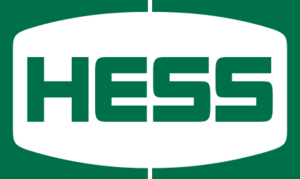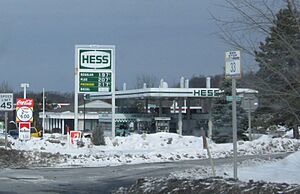Hess Corporation facts for kids
 |
|
|
Formerly
|
Amerada Hess Corporation |
|---|---|
| Public | |
| Traded as | NYSE: HES S&P 500 component |
| Industry | Oil and gas |
| Founded | December 11, 1919 |
| Founder | Leon Hess |
| Headquarters | 1185 6th Avenue, 40th Floor, , |
|
Area served
|
Worldwide |
|
Key people
|
John B. Hess (CEO) |
| Products | |
| Revenue | |
|
Operating income
|
|
| Total assets | |
| Total equity | |
| Owner | John B. Hess (9.5%) |
|
Number of employees
|
1,623 (2022) |
Hess Corporation, once known as Amerada Hess Corporation, is an American energy company. It focuses on finding and producing crude oil and natural gas around the world. The company was created in 1968 when two companies, Hess Oil and Chemical and Amerada Petroleum, joined together.
Leon Hess was the company's leader for many years, from the early 1960s until 1995. His son, John B. Hess, then took over as chairman and CEO. Hess Corporation's main office is in New York City. It is known as one of the largest public companies globally. Recently, another big oil company, Chevron, agreed to buy Hess Corporation.
Hess has operations on land in the United States, especially in North Dakota, and in Libya. They also work offshore (in the ocean) in places like the Gulf of Mexico in the U.S., Canada, South America (Guyana and Suriname), and Southeast Asia (Malaysia).
Contents
How Hess Corporation Started and Grew
In 1919, a British oil businessman named Lord Cowdray started Amerada Corporation. His goal was to find and produce oil in North America. The company officially began in 1920. It grew well during the 1920s, making good profits.
However, as the 1930s approached, the oil market became weaker. This led to lower profits for Amerada. The Wall Street Crash of 1929 made things even harder for the oil industry. In 1930, the company even lost a small amount of money. The early years of the Great Depression were tough, with low demand and too much oil being produced. But by the later 1930s, Amerada's financial outlook started to improve.
In 1941, the company changed its structure. It combined its main company with its operating part. The new, simpler company kept the name Amerada Petroleum Corporation. By 1955, after World War II, the company had grown a lot. Its yearly sales went over $100 million.
Joining Forces: Hess and Amerada
Hess Oil and Chemical was an oil refining and marketing company. It was started by Leon Hess in the 1930s. In 1966, Hess Oil and Chemical bought a part of Amerada for $100 million. In December 1968, Hess and Amerada announced they planned to merge.
Some Amerada stockholders were not happy with the merger plan. They felt it was too good for Hess. They argued that Amerada's oil reserves were the most valuable part. They believed Amerada stockholders should have more control in the new company.
Another oil company, Phillips Petroleum, also offered to merge with Amerada. But Amerada turned down this offer in March 1969. Hess then bought more Amerada shares to help the merger happen. Despite some disagreements from shareholders, the merger was approved. This big deal, worth $2.4 billion, combined a company that found oil with one that refined and sold it.

Expanding and Changing Business
In 2000, Hess bought Meadville Corporation. This meant all 178 Merit gas stations became Hess stations. These stations were mostly in cities like Boston, New York, and Philadelphia.
In 2001, Amerada Hess bought Triton Energy Limited. This deal was worth about $3.2 billion. Triton was a large independent oil and gas exploration company. This purchase helped Amerada Hess get more oil and gas reserves. It also increased the company's daily oil output by over 25 percent.
Also in 2001, Amerada Hess teamed up with A.T. Williams Oil Co. from North Carolina. Their gas stations changed names to WilcoHess. After this partnership, there were about 1200 WilcoHess stations.
After these big changes, energy prices dropped. Amerada Hess faced challenges in the following years. In 2002, the company lost $218 million. However, from 2003 to 2006, Amerada Hess's profits steadily increased.
In May 2006, Amerada Hess Corp. officially changed its name to Hess Corp.
Focusing on Oil Production
In 2012, Hess announced it would close its Hovensa refinery in St. Croix. The refinery would then be used just for storing oil. By early 2013, Hess also permanently closed its Port Reading, New Jersey, refinery. The company decided to leave the refinery business. It wanted to focus only on finding and producing oil.
In March 2013, Hess announced it would sell its refineries and gas station businesses. This was a big change. The company decided to focus completely on oil production. This is a trend in the oil industry. Many companies are selling their "downstream" assets (like refineries and gas stations). They want to focus on their more profitable "upstream" business (finding and producing oil).
Hess sold its Russian business to Lukoil for $2.05 billion in April 2013. In July 2013, it sold its energy marketing unit to Centrica for about $1.03 billion. In October 2013, Hess also sold its storage terminals on the East Coast and in St. Lucia.
In December 2013, Hess sold its assets in Indonesia to an Indonesian oil group.
Selling the Gas Stations
On January 8, 2014, Hess planned to separate its gas station network into a new company. This new company would be called Hess Retail. It would have over 1,200 stores in the Eastern United States.
However, before this separation happened, Marathon Petroleum's company, Speedway LLC, announced it would buy Hess Corporation's retail business. This deal was for $2.87 billion. After the sale was completed in late 2014, all Hess gas stations slowly changed their names to Speedway stations by the end of 2017. This sale completed Hess's transformation. It became an energy company focused only on finding and producing oil. This was a big change from the merger almost 50 years earlier.
In 2014, Hess finished its multi-year plan to become an exploration and production company. It sold all its "downstream" operations. This included selling its gas stations to Marathon Petroleum (Speedway). It also sold its oil, natural gas, and electricity marketing business to Direct Energy. Hess also closed its refineries in New Jersey and St. Croix. It sold most of its storage business and its interests in two power plants.
In October 2023, Chevron Corporation announced that it plans to buy Hess Corporation. This big deal is worth $53 billion.
Caring for the Environment
Hess Corporation has a history of working to protect the environment. In 1990, a barge carrying kerosene spilled some fuel into the Hudson River. Hess quickly took responsibility for cleaning it up. The United States Coast Guard worked with another company to contain and clean the spill. Officials noted that good weather helped with the cleanup. Hess stated that their company policy is to follow all environmental safety rules. They also said they clean up every spill that happens.
Later, Hess Corporation agreed to pay $1.1 million in fines. This was part of an agreement with the New York State Department of Environmental Conservation. The agreement helped fix over 100 violations at 65 gas stations and a large oil storage facility in Brooklyn.
In a water contamination case, Hess Corporation was one of several oil companies that paid part of a $422 million settlement. This case involved water contamination from a gasoline additive called MTBE. The settlement also required the companies to help pay for cleaning affected water wells for 30 years.
Hess has also shared its plan to reduce greenhouse gas emissions. This plan has four steps: monitoring, measuring, managing, and reducing these emissions. The company aims to improve its environmental impact. It does this by reporting results, using energy more efficiently, and participating in carbon capture efforts.
In December 2022, Hess Corporation was added to the Dow Jones Sustainability World Index. This shows that the company is recognized for its efforts in sustainability.
Where Hess Stations Used to Be
Before March 2013, Hess operated gas stations in many states. These included Alabama, Arkansas, Connecticut, Delaware, Florida, Georgia, Maryland, Massachusetts, New Hampshire, New Jersey, New York, North Carolina, Pennsylvania, Rhode Island, South Carolina, Tennessee, and Virginia. They also had stations in Washington, D.C.
In May 2014, Speedway LLC bought Hess Corporation's gas station business. Hess had 1,342 locations across the Eastern United States. All Hess gas stations slowly changed to Speedway stations by the end of 2017. This included all the WilcoHess locations that Hess had bought earlier.
Later, in 2021, 7-Eleven bought Speedway. This meant the former Hess locations became part of 7-Eleven. Due to rules about fair competition, 7-Eleven and Marathon had to sell some Speedway locations to other buyers. Many of these were former Hess stations in Florida and New York.
As of 2018, some Hess locations still exist in certain states, including Connecticut.
See also
- Alaska v. Amerada Hess
- Hess Corporation (toys)
 | Sharif Bey |
 | Hale Woodruff |
 | Richmond Barthé |
 | Purvis Young |

